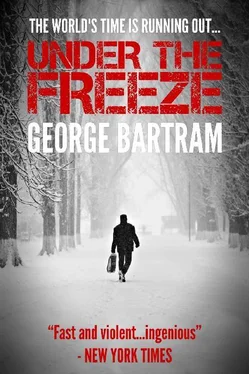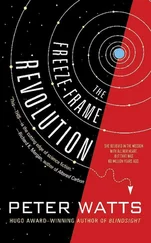She shuffled in, wearing felt slippers and a man’s overcoat over a wool skirt. She had been crying. They drank the vodka in an almost ceremonial way. Welcome to Moscow .
The old man wanted to refill Tarp’s glass and settle down to serious drinking, but Tarp covered it and stood up. “What do you do?” he said. “During the day?”
The old man hedged, finally allowed that he picked through trash containers in the streets.
“You know the statue of Gogol?” Tarp said. “Near the power station?”
“Gogol the playwright?”
“Are there two Gogols?”
“Near a power station?”
“Do you or don’t you?”
“I guess I do.”
“I want you to go there tomorrow.”
The old man looked stunned. “It’s half across Moscow!”
“You’ll be paid.”
The old woman showed Tarp where he would sleep, a filthy space the size of a closet with one small electric bulb in its ceiling for both heat and light. “You want blankets?” she said.
“Of course.” He guessed the temperature in the room to be about fifty.
She shuffled into their bedroom, banged some doors, then appeared loaded down with ancient comforters, seemingly more than he would ever need. She opened her arms when she got near him; bedclothes cascaded to the floor in a pile. She turned around and went back into the bedroom and closed the door.
Tarp put several of the comforters under him, the rest on top. He slept in the long underwear he had worn from France. In the middle of the night he felt movement on his legs, then itching. He had a small flashlight, and in its beam he saw fleas. He stripped, then sat in the cold, cracking the shiny brown bloodsuckers between his fingernails. They were still slow because of the cold, but he got tired of it, and he put out his light and went to sleep. He even smiled a little, feeling the low hum of tension in himself that always came when things were moving. He imagined himself face-to-face with Maxudov, and he fell asleep.
In the morning he marked up a copy of Novy Mir , following the code he had worked out with Repin, handed it to the old man, and told him where to leave it near the Gogol statue.
“Then what do I do?”
“Come home. Pick up rubbish. As you wish.”
“I don’t wait by Gogol?”
“Certainly not.” The man was wearing two overcoats over his sweaters and a torn leather helmet of the kind that aviators used to wear. “I will know if you do not do exactly as I want. You know what will happen if you do it wrong?”
The old man licked his lips. “Yes.”
“Good.”
The next day he sent him to a suburban railway station to look for a message in the restroom. There was none; Tarp had not really expected one yet. The day after, however, the old man had his awful grin on when he came in the door. He handed Tarp a crumpled sheet of newspaper. “It came, it came!” he crowed.
“What came?”
“The message, the message you have been waiting for!”
“You are an idiot.”
The message was stark — three words indicated by needle pricks five words after those that mattered: Yes Where When . Tarp’s first message had been picked up by a French cutout who had passed it to an Italian who had sent it through two Soviet entrepreneurs; the reply had come through a channel almost as tortuous. Tarp marked up another copy of Novy Mir and sent the old man back to Gogol. He sat quietly in the old house, feeling the hum of suppressed excitement but showing nothing, content to smell the sour smell, to listen to the rats in the walls. After he sent off the second message his tension increased, because now he was sitting like the bait in a trap. Now they knew where he was, and if they wanted, they could make him vanish the way magicians caused things to vanish in stories.
At twilight of the next day a van backed into the untended lot behind the house. Tarp was sitting in the kitchen, which was the only warm room. He heard the engine as the driver gunned it up over the curb; the old man and woman heard it, too, and they went to a window and tried to look through the rags.
“It’s a school van,” the woman said, “it says so.”
“This has never happened before,” the man said. He looked tearful, almost sentimental, like the sad clowns that bad painters make pictures of; Tarp knew that he was frightened.
A door slammed.
“Somebody’s coming!” the old woman cried, and she ran into the middle of the kitchen.
“Let them in,” Tarp said.
“No!” She began to whisper to herself. Tarp remembered the same sound when he had arrived.
There was a bold knock at the door.
“Open it,” Tarp said.
The old woman tottered to the door. It took her a long time to unwrap the chain and to take down the wood props that they used for security.
When the door was open a man pushed past her without haste and came into the kitchen. He looked around with professional caution. He had drawn a pistol, a 9mm Makorov, a big, powerful weapon. Two other men came in behind him, similarly armed.
“Are you Tarp?” the first one said in Russian.
“Yes.”
If they were going to kill him, he thought, they would not do it here. They would take him somewhere outside the city, out on the still frozen ground of a forest.
The man looked around again. He was in his midthirties, one of those sleek, rather round-faced men who seem good-looking because they take care of themselves. He even smelled good; Tarp caught his scent over the smells of the kitchen and the rats.
He was probably from the Guards Directorate, a hand-picked and utterly loyal gunman.
“This place won’t do,” the man said. “It stinks.” He walked out of the room, moving the old man out of the way with the same ease and the same lack of interest with which he might have moved a curtain. The old man was looking at Tarp with hatred; next to him, the old woman was sobbing. Tarp was the only one sitting down.
He heard a jingle of keys and then the sound of a door, then hollow footsteps from that part of the house where the school things were stored. The footsteps got softer and then louder; doors banged; once, something fell and the old man flinched. After ten minutes the sleek man came back; he had put his gun away. He picked up a rag from the wooden sink and wiped his hands on it, hating the rag as much as the dirt. “We’ll use a room in there,” he said. “I left the light on so you’d know which one. Get to it.”
The other men went past him and disappeared. The round-faced man, who had been wearing a fur hat like the one in which Brezhnev had so often been photographed, put the hat on the broken kitchen table and pulled up a chair. He unbuttoned his heavy cloth coat and let it fall open. Tarp and the round-faced man sat quietly as noises came from the other part of the house; the old man fidgeted.
“Sit over there,” the round-faced man said. He looked at a bench against the far wall; the old couple almost ran to sit on it. “I have vodka,” the old man said, as if he had been waiting to be spoken to.
“No.”
The old woman clutched his arm and wept.
Twenty minutes later one of the men came back and hunted until he found the remains of a broom. He came back a few minutes later with a piece of cardboard covered with trash, and he threw it and the trash and the broom out into the yard.
“You want to look?” he said.
The round-faced man stood up. “Stay here,” he ordered. He was gone only a short time; when he came back he said, “It still stinks. Fix it.” One man went to the van and fetched a string bag in which Tarp could see aerosol cans and plastic bottles. By and by a more pleasant odor, spiced and piney, reached him from the other part of the house.
Читать дальше












